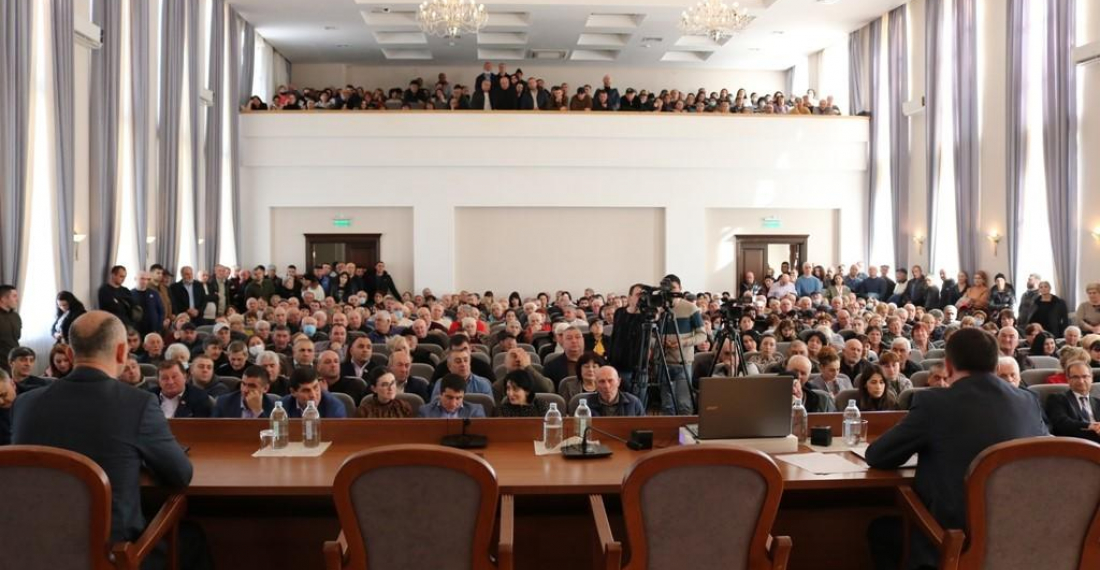Politics in South Ossetia often takes a Lilliputian character. The tiny territory that seceded from Georgia after the collapse of the Soviet Union, and has existed as a Russian protectorate since, is small in size, with a population of around 50,000. Yet its internal politics are often dramatic, with long standing clan feuds playing out in modern political terms. One such crisis appears to be looming
For six months the territory has been gripped by a political crisis in a stand-off between president and parliament. It follows the death whilst in police detention of a young Ossetians, Inal Dzhabiev. His family and clan have pledged vengeance. They wanted the prosecutor general to resign. He didn’t, and 14 out of the 34 members of the territory’s parliament started a boycott of the legislature, depriving it of a quorum. According to one of the MPs, David Sanakoev, the MPs want the dismissal of the Prosecutor General to be on the agenda of the parliament.
Under the parliament’s rules 23 MPs have to be present for decisions to be made. With the budget not approved, and a raft of other administrative matters brought to gridlock, the situation is now coming to a final showdown.
The government has given the MPs until Tuesday (16 February) to come to the parliament so the budget can be approved, or else…..! Quite what the “or else” is, is not clear.
On Friday (12 February) 18 pro government MPs turned up to listen to complaints from pensioners that had not received their pensions as a result of the stalemate. The president himself, Anatoli Bibilov, also arrived. He accused the opposition of trying to make political capital from the death of Inal Dzhabiev
He said he met with opposition deputies to get them back to work, but they did not come to an agreement even though they received answers to all their questions, because he said “they are not interested in the investigation of the case, their goal is to create chaos”.
The matter becomes more serious because of the involvement of Russia. Russia has bankrolled South Ossetia, especially since it recognised it as an independent state in 2008. More than 80% of the territory's budget comes from Russia. Russian politicians cannot understand how such a tiny place can create so many problems for their geo-strategic ambitions and be so ungrateful. Recently, Moscow sent a delegation from the Federation Council to try to sort out the dispute, but Bibilov said that that did not work either
“We live thanks to Russia, thanks to them we receive pensions and salaries. They are building schools and kindergartens for us, but, nevertheless, many today speak against Russia. What happened to the Ossetian people? Shouldn't we be grateful to our saviours? Just imagine that Russia no longer supports us, what will happen to us. How many good things Konstantin Kosachev himself did to us, in difficult times for our republic he supported us, spoke for us in world platforms. The Russian delegation wanted to convey to the deputies that by their actions they are inflicting a blow on Russia, because Russia gave us independence, ”he said.
Anatoly Bibilov then asked the loyal deputies to adopt the budget themselves, without waiting for the opposition deputies.
“I once again appeal to you deputies, as a president, who has in the constitution, that he is the guarantor of the observance of the rights of the constitution, the guarantor of human rights, as a person, as an Ossetian - so that they come and give the people their salaries and pensions, so that we, we lived as a republic. It is our duty to serve the people, and we must fulfil this duty.”
Bibilov’s courage however has its limits. He told the MPs he had spoken with Moscow
He also noted that he communicated with colleagues from Moscow, "and they said that we should give them time until Monday."
“They will talk with the deputies and it will be clear by the next week. Probably we will have no other choice but to come and adopt this budget ourselves, ”he concluded.
And thus is the state of the rule of law in the Caucasian Lilliput






